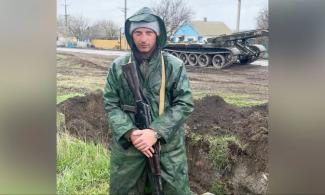
He said Russia now sees him as a traitor and defector for deciding to quit the Russian Army.
A former senior Russian military officer Konstantin Yefremov, has admitted to brutal interrogations, where Ukrainian men were shot and threatened with rape by Russian troops.
Yefremov, in an exclusive interview with the BBC, said Russia now sees him as a traitor and defector for deciding to quit the Russian Army.
He said at one site in southern Ukraine, "the interrogations, the torture, continued for about a week".
"Every day, at night, sometimes twice a day."
Yefremov said he tried to resign from the army numerous times - but he ended up being dismissed for refusing to return to Ukraine.
"I decided to quit. I went to my commander and explained my position. He took me to a senior officer who called me a traitor and a coward.
"I left my gun, got in a taxi and drove off. I wanted to return to my base in Chechnya and resign officially. Then my comrades telephoned me with a warning.
"A colonel had promised to put me in prison for up to 10 years for desertion and he'd alerted the police."
He added that he was advised by his military lawyer to turn around.
Yesrevmiv said on February 27, 2022, three days after the Russian invasion, he and his men were ordered to move north from occupied Crimea. They headed for the city of Melitopol.
The next 10 days were spent at an airfield which had already been captured by Russian troops.
"Soldiers and officers grabbed everything they could. They climbed all over the planes and went through all the buildings.
“One soldier took away a lawnmower. He said proudly, 'I'll take this home and cut the grass next to our barracks.'
"Buckets, axes, bicycles, they bunged it all in their trucks. So much stuff they had to squat down to fit in the vehicles."
He said his group moved to guard what he described as a "logistics headquarters" in April - in the town of Bilmak, to the north-east of Melitopol, where he says he witnessed interrogations and mistreatment of Ukrainian prisoners.
He recalls a day when three prisoners were brought in.
"One of them admitted to being a sniper. On hearing this, the Russian colonel lost his mind. He hit him, he pulled the Ukrainian's trousers down and asked if he was married.
"'Yes,' the prisoner replied. 'Then someone bring me a mop,' said the colonel. 'We'll turn you into a girl and send your wife the video.'"
Another time, says Mr Yefremov, the colonel asked the prisoner to name all the Ukrainian nationalists in his unit.
"The Ukrainian didn't understand the question. He replied that the soldiers were naval infantry of the Ukrainian armed forces. For that answer, they knocked out some of his teeth."
The Kremlin wants Russians to believe that, in Ukraine, Russia is fighting fascists, neo-Nazis and ultra-nationalists. This false narrative serves to dehumanise Ukrainians in the eyes of the Russian public and the military.
Mr Yefremov says the Ukrainian prisoner had a blindfold on.
"The colonel put a pistol to the prisoner's forehead and said 'I'm going to count to three and then shoot you in the head.'
"He counted and then fired just to the side of his head, on both sides. The colonel started shouting at him. I said: 'Comrade colonel! He can't hear you, you've deafened him!'"
Yefremov describes how the colonel gave orders that the Ukrainians shouldn't be given normal food - only water and crackers. But he says: "We tried to give them hot tea and cigarettes."
So that the prisoners didn't sleep on bare ground, Mr Yefremov also recalls how his men tossed them hay - "at night, so that no-one saw us".
During another interrogation, Yefremov says the colonel shot a prisoner in the arm - and in the right leg under the knee, which hit the bone. Konstantin says his men bandaged the prisoner up and went to the Russian commanders - "not to the Colonel, he was crazy" - and said the prisoner needed to go to hospital, otherwise he would die from blood loss.
"We dressed him up in a Russian uniform and took him to hospital. We told him: 'Don't say you're a Ukrainian prisoner of war, because either the doctors will refuse to treat you, or the injured Russian soldiers will hear and shoot you and we won't be able to stop them."
He has now fled Russia after he contacted Russian human rights group Gulagu.net, which helped him leave the country.